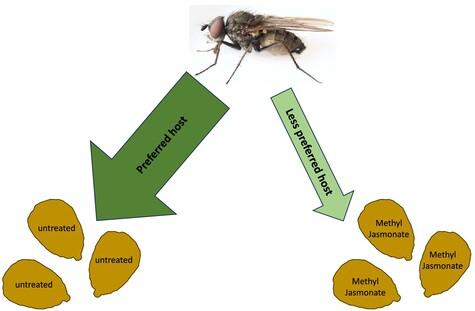当前位置:
X-MOL 学术
›
Pest Manag. Sci.
›
论文详情
Our official English website, www.x-mol.net, welcomes your
feedback! (Note: you will need to create a separate account there.)
Effects of methyl jasmonate seed treatments on adult oviposition preference and larval performance of seed corn maggot (Delia platura) in corn (Zea mays)
Pest Management Science ( IF 3.8 ) Pub Date : 2024-08-31 , DOI: 10.1002/ps.8392 Swayamjit Ray 1 , Gen-Chang Hsu 1 , Noelle T Pappous 1 , Olivia Rooney 1 , Alan G Taylor 2 , Jennifer S Thaler 1
Pest Management Science ( IF 3.8 ) Pub Date : 2024-08-31 , DOI: 10.1002/ps.8392 Swayamjit Ray 1 , Gen-Chang Hsu 1 , Noelle T Pappous 1 , Olivia Rooney 1 , Alan G Taylor 2 , Jennifer S Thaler 1
Affiliation

|
BACKGROUNDEliciting host plant resistance using plant hormones such as jasmonates has the potential to protect seeds and seedlings against insect pests; however, several hurdles exist for adapting it for pest management. This includes determining a dose that promotes resistance without limiting plant growth, an application method that growers could use, and ensuring the plants are responsive in the abiotic conditions when the pest occurs. In laboratory and field assays, we tested if treating corn seeds with multiple concentrations of methyl jasmonate would reduce the preference of ovipositing seed corn maggot adults and the performance of larvae feeding on seeds.RESULTSWe found that corn seeds soaked in aqueous 0.2 mM methyl jasmonate solution showed marginally lower seedling growth, but the adult oviposition preference was ~60% lower on these seeds compared to control water‐soaked seeds. Seeds that were treated with methyl jasmonate using a conventional polymer‐based seed coating showed no effect on seedling growth but reduced adult oviposition preference. In no‐choice bioassays with adult flies, we found reduced oviposition on seeds soaked with aqueous methyl jasmonate compared to controls. Larval survival to pupation was also lower in methyl jasmonate‐treated seeds. Lastly, the methyl jasmonate‐induced resistance also occurred at the lower temperatures typical of the spring soil conditions when this fly is most damaging.CONCLUSIONMethyl jasmonate seed treatment in aqueous solution or using conventional polymer‐based technology, has the potential to deter adult oviposition and reduce maggot performance in spring temperature conditions with minor effects on seed germination and growth. © 2024 Society of Chemical Industry.
中文翻译:

茉莉酸甲酯种子处理对玉米(Zea mays)种子玉米蛆(Delia platura)成虫产卵偏好和幼虫性能的影响
背景技术利用茉莉酸等植物激素引发宿主植物的抗性有可能保护种子和幼苗免受害虫侵害;然而,将其应用于害虫防治存在一些障碍。这包括确定在不限制植物生长的情况下促进抗性的剂量、种植者可以使用的施用方法,以及确保害虫发生时植物在非生物条件下做出反应。在实验室和田间试验中,我们测试了用多种浓度的茉莉酸甲酯处理玉米种子是否会降低排卵种子玉米蛆成虫的偏好以及幼虫取食种子的性能。结果我们发现将玉米种子浸泡在 0.2 mM 茉莉酸甲酯水溶液中幼苗生长稍慢,但与对照水浸种子相比,这些种子的成虫产卵偏好低约 60%。使用传统聚合物种子包衣用茉莉酸甲酯处理的种子对幼苗生长没有影响,但降低了成虫的产卵偏好。在对成年果蝇进行的无选择生物测定中,我们发现与对照相比,用茉莉酸甲酯水溶液浸泡的种子的产卵减少。在茉莉酸甲酯处理的种子中,幼虫化蛹的存活率也较低。最后,茉莉酸甲酯诱导的抗性也发生在典型的春季土壤条件的较低温度下,此时这种苍蝇最具破坏性。 结论 在水溶液中或使用传统的聚合物技术进行茉莉酸甲酯种子处理,有可能阻止成虫产卵和降低春季温度条件下蛆的表现,对种子发芽和生长影响较小。 © 2024 化学工业协会。
更新日期:2024-08-31
中文翻译:

茉莉酸甲酯种子处理对玉米(Zea mays)种子玉米蛆(Delia platura)成虫产卵偏好和幼虫性能的影响
背景技术利用茉莉酸等植物激素引发宿主植物的抗性有可能保护种子和幼苗免受害虫侵害;然而,将其应用于害虫防治存在一些障碍。这包括确定在不限制植物生长的情况下促进抗性的剂量、种植者可以使用的施用方法,以及确保害虫发生时植物在非生物条件下做出反应。在实验室和田间试验中,我们测试了用多种浓度的茉莉酸甲酯处理玉米种子是否会降低排卵种子玉米蛆成虫的偏好以及幼虫取食种子的性能。结果我们发现将玉米种子浸泡在 0.2 mM 茉莉酸甲酯水溶液中幼苗生长稍慢,但与对照水浸种子相比,这些种子的成虫产卵偏好低约 60%。使用传统聚合物种子包衣用茉莉酸甲酯处理的种子对幼苗生长没有影响,但降低了成虫的产卵偏好。在对成年果蝇进行的无选择生物测定中,我们发现与对照相比,用茉莉酸甲酯水溶液浸泡的种子的产卵减少。在茉莉酸甲酯处理的种子中,幼虫化蛹的存活率也较低。最后,茉莉酸甲酯诱导的抗性也发生在典型的春季土壤条件的较低温度下,此时这种苍蝇最具破坏性。 结论 在水溶液中或使用传统的聚合物技术进行茉莉酸甲酯种子处理,有可能阻止成虫产卵和降低春季温度条件下蛆的表现,对种子发芽和生长影响较小。 © 2024 化学工业协会。































 京公网安备 11010802027423号
京公网安备 11010802027423号